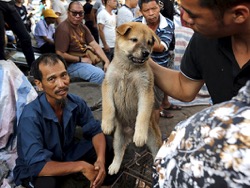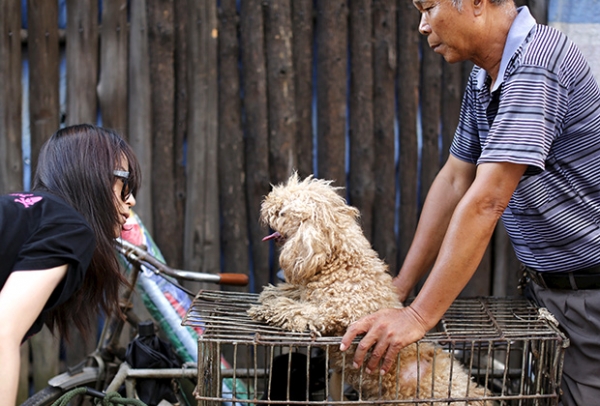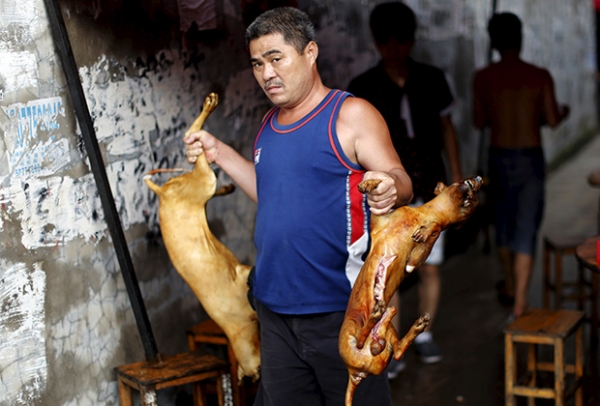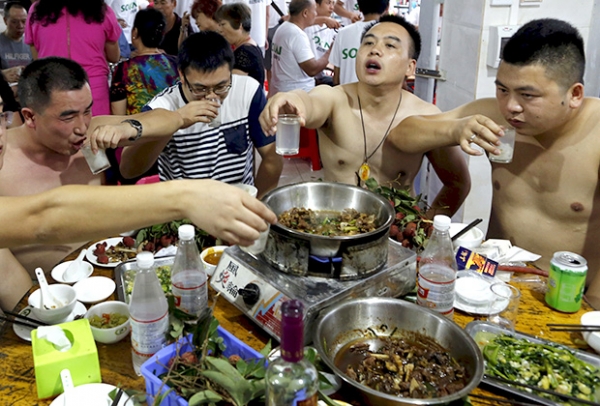
Why in the PRC to protect the rights of animals easier than people’s rights
In China the activities of NGOs are strictly regulated. However, there are dozens of human rights organizations. However, they are fighting for the rights of the person and animals. And it meets the warm approval of the official Beijing. Why — versed Professor Peter Lee, the author of the Foreign Affairs magazine. “Ribbon.ru” presents the readers a translation of his article.
In recent years a field for political dissent in China decreased significantly, but gaining popularity, the animal welfare movement. Last month, thousands of Chinese users flooded the Chinese segment of the Internet with angry messages about the kidnapping of a guide dog named Caocao — they were afraid that the dog will sell for meat. In 35 hours after the start of the online campaign the thief returned the dog without any ransom, with an anonymous note asking for forgiveness.
The custom of the Chinese to eat animals, which in other countries are kept as Pets, are widely known. As well known, and the efforts of the Chinese animal rights activists trying to put an end to this practice. Every year for culinary purposes in China killed 10 million dogs, 70 percent of which are stolen Pets. In 2011, the activists succeeded in closing the annual festival of eating dogs in the province of Zhejiang, whose history totals not one century. However, the most popular festival of eating dogs, held in the city of Yulin (Shaanxi province) since 2010 in the hope of attracting tourists, was closed. In 2014, activists in Northern China has intercepted 18 trucks chock-full of dogs, and saved eight thousand animals. In 2015 a similar event saved three thousand dogs.
But the movement for animal rights in China is not limited. Its forms are as varied as China itself. For many years activists trying to end the practice of content farms on wild animals. The demand for bear bile, estimated at 1.6 billion us dollars, has led to the culling of more than 10 thousand Asiatic black bears and five thousand tigers. The animals are now on farms and used solely for the extraction of bile, which is part of cosmetic and pharmaceutical products, traditional medicines. In addition, in the PRC on animals still experience cosmetic preparations, although local scientists are working closely with British colleagues to find an alternative — for example, artificially grown skin cells.

Animal rights activist trying to buy a dog designed for eating festival in Yulin
Photo: Kim Kyung-Hoon / Reuters
China is the world’s largest meat producer. Only in 2013 the Chinese breeders have sold 80 million tons of meat is twice more than American. In China is still barely used humane methods of slaughter. The first experiments in this direction are 2007. A couple of years later, the government issued a document ordering the slaughter animals without unnecessary suffering, but who and now there.
In Chinese zoos animals are being abused, beating them if they do not comply with the requirements of the caretakers. Tigers and lions are intentionally starved, that they may with greater fury, killed and devoured their victims during public feedings. Under pressure from animal welfare activists and visitors to zoos in major cities of China — Beijing and Shanghai — have changed the treatment of animals, completely abandoning public feeding predators. But that is an exception: Beijing and Shanghai is a huge metropolis, which attracts tourists from all over the world. Zoos there is simply forced to conform to the standards dictated by considerations of humanity.
Ancient traditions
In China with its inherent ideals of Confucianism, Taoism and Buddhism, the history of the struggle for the rights of animals over several centuries. Poet during the Tang dynasty encouraged not to kill the birds in the spring, because “the Chicks waiting in the nests of their mothers”. Unjan the Emperor of the Qing dynasty loved dogs and had forbidden them to eat. Ancient Chinese laws prescribed moderation in fishing, hunting in spring, the destruction of bird nests and eggs production, it also prohibited to ill-treat an animal.
The country’s first Association for the protection of animals was formed in the 1930-ies in Nanjing, the then capital of the Republic of China — Chinese people having foreign education. However, the movement for humane treatment of four-legged fade away, not having time to emerge. In 1949 came to power, Mao Zedong, who considered the protection of animals “bourgeois sentimentality”. In the period of his reign, he was at the helm of the state until 1976 — phrases such as “protection of animals”, “animals” and “compassion for animals” has almost disappeared from the Chinese vocabulary.
The famine of 1959-1961 years, which killed 20 to 40 million people, greatly influenced the Chinese attitude toward food. At that time any animal that had been caught went into the pot. After 1979, the government was Deng Xiaoping, one of the main concerns of the state was development and ensuring food security for the many millions of people. The Chinese model of development did not provide any humanism in terms of slaughtering. However, as the country opened to the world, popular Western ideas of animal welfare have increasingly penetrated the Chinese border. In the 1980s world wildlife Fund (WWF) has opened in China its office. WWF and the international conservation Fund of cranes (International Crane Foundation) — the first foreign animal protection organizations, who came to mainland China. They brought with them ideas about environmental ethics and the humane treatment of animals.
In 1992 founded the first initiative group to promote the idea of animal rights protection, China Association for the protection of small animals (CSAPA). She was active in educational activities and organized a number of campaigns aimed at changing laws about Pets dogs — cumbersome set of regulations designed to limit the number of samokovlija. First, activists have sought cancellation of the law passed under Mao, which in principle was forbidden to keep dogs at home, then it was believed that this practice came to China from abroad and contrary to the ideals of socialism. However, the requirement for registration of dogs persisted.

Dogs for food
Photo: Kim Kyung-Hoon / Reuters
CSAPA has become a symbol of struggle for animal rights: activists argued the public and the authorities that the welfare of animals — a serious question. CSAPA has set itself three goals: to put an end to the cruel treatment of animals, educate the public about all such treatment and to achieve a legislative solution to contain four-legged friends in the home. As a result, by the late 1990s all over mainland China operated hundreds of cooperately groups, voluntary associations and animal shelters. Today in China there are over 130 million dogs, of which 30 million home. Moreover, Chinese society is becoming more tolerant towards sobakovladeltsam.
A new generation of Chinese, especially urban youth, not tolerate harsh treatment of animals. Unlike older relatives who remember the empty shelves under Mao, the youth thinks less about items and more about their quality. Young people acknowledge that the quality of food products directly depends on the welfare of animals: for example, if the cattle were fed with concentrates, she can get sick and the meat is unsafe for human consumption.
Outside
The activities of the Chinese animal welfare activists have stepped outside of the country. In 2012 the American company ZZYX Entertainment has invited the Chinese people’s Association for friendship with foreign countries, under the patronage of the Ministry of foreign Affairs, to organize the biggest in the world Rodeo show at the national stadium in Beijing. This initiative immediately ran into stiff opposition from 68 Chinese NGOs, led by the Beijing Association for the protection of animals (CAWA). With the support of U.S. opponents of the Rodeo organization from SHARK Association held talks with Chinese foreign Ministry officials and American businessmen funding the project, and also arranged three conferences on which has told about the cruelty that prevails in this sport. As a result, Chinese NGOs have made their show was canceled.

Feast of dog meat in Yulin
Photo: Kim Kyung-Hoon / Reuters
Another win Chinese activists won on the economic field. In 2010, Canada tried to organize the sale of seal meat to China. Beijing officials reacted to this positively, but the Chinese animal welfare activists headed CAWA wrote to the government urging them to ban the import of seal meat. They staged protests at international exhibitions and shows, where the canadian company tried to exhibit the products of the seal fishery. Yet by January of 2011 the negotiations on the deal reached the finish line. Then the activists accused the Canadians of being racist, pointing out that Ottawa treats China as a “dumping ground for seal meat”, as import this product in Europe was banned in 2009. Shortly thereafter, the Chinese government took a time-out for additional study of the circumstances of the case, and then put the deal under the carpet. In April 2014, Canada’s Minister of fisheries and oceanic resources Gail Shea accused the animal rights activists in the failure of the contract.
Although many activist groups operate informally because of the strict bureaucratic rules that hamper the registration of NGOs, campaign for the protection of the rights of animals are successful — thanks to a strong team of activists, aid officials sympathetic to their case, international support and wide media coverage. But most important of all, the animal did not climb in a policy. Chinese authorities pay to the issue of political stability, special attention, and therefore, they are much more concerned about the activists fighting for workers ‘ rights and human rights, separatist groups in Xinjiang and Tibet, and the Falun Gong. Promotion of animal welfare activists, as a rule, does not pose an immediate threat to the stability of the state.
In General, the actions of animal rights activists are in line with the efforts of Chinese authorities to modernize the country, both culturally and economically. While the extraction of bear bile spinning a lot of money, it is negligible in the total scale of China’s economy, whose GDP is over 10 trillion dollars. The cessation of bear bile extraction does not hurt the Chinese economy, but will help to improve relations with the countries condemning this practice. If the Chinese will improve the conditions of detention of cattle at large enterprises, that is, of course, will lead to increased costs. But at the same time will increase significantly and product quality, and that the Chinese government pays great attention since the melamine scandal of 2008, when tens of thousands of sick children.
For too long animal rights activists around the world were silent about the suffering of animals in China, complaining only once a year — in the days of the festivals of the summer solstice, when hammered and eaten thousands of dogs. Of course, this is a serious problem that China needs to decide if the country really wants to modernize. But in China there are six thousand species of vertebrates — more than anywhere else in the world. And the animal rights applies not only to a single Zoological species.








